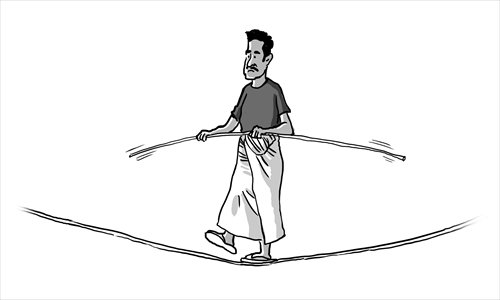Myanmar sits on the corner of an international triangle

Illustration: Liu Rui/GT
In Beijing and Washington, there seems to be an official but unadmitted, common, and simplistic, interpretation of competing interests in Asia: China and the US are locked in East Asia in a zero-sum game for influence.
In Beijing, this is viewed as a US-led containment policy to limit Chinese regional prominence, and is epitomized by the "pivot" or restructuring and strengthening of US interests in East and Southeast Asia.
In Washington, there are concerns over Chinese efforts to increase its influence in the region, exemplified by the East China Sea Air Defense Identification Zone and the Chinese claims to sovereignty over the South China Sea.
In a far less contentious area - Myanmar - the same, virtually confrontational, dynamic is evident but less direct.
Many Chinese feel that their profound interests - strategic, energy, infrastructure, economic - have been undercut by the improvement in Myanmar-US relations, while some in Washington have decried what was previously regarded as Myanmar's "client state" status of China. This is "Cold War" thinking redux.
Both positions are erroneous and indirectly regard the Myanmar people as simply pawns in a larger power disagreement. Those who hold the zero-sum position on either side are, in effect, denigrating the capacity of the government of Myanmar to determine its own policy and national interests.
Myanmar's historic neutralist policy is well-known and served that country well. China may have believed that the signing with Myanmar of the "Comprehensive Strategic Cooperation Partnership" in May 2011 would bring back the almost mythic Pauk Paw (sibling) relationship of the 1950s, but that was a euphemism for a marriage of geographic convenience and power necessity.
The disillusionment with Myanmar relations proceeded apace with the suspension of China's construction of the Myitsone Dam in September 2011, followed by the virtually unprecedented visits by the US secretary of state and president later.
Conspiracy theories abound in Beijing, related to US attempts to contain China in Myanmar. But in Washington and elsewhere, suspicions, later proven to be unfounded, of Chinese bases in Myanmar were the equivalent of such conspiracy theories.
This Southeast Asian country has been adept in managing its foreign relations to suit its concerns. Although there must be some in the government who probably feel the state has been too close to China since 1988, there will be others who will likely assert it has become too close to the US since 2011.
Myanmar will probably not want to see either party have undue influence on its society. At the same time, both China and the US have concerns. China does not want to see the US exert influence or have a presence on the China-Myanmar border in minority regions, and the US does not want to see Myanmar closely linked to the Chinese military, or see China establish bases in Myanmar.
Myanmar may fear the extremely unlikely event of China and the US "ganging up" on Myanmar. But it would be in the interests of Myanmar to initiate actions that could ease and eventually eliminate the supposed zero-sum game elements of these foreign interests in Myanmar.
The initial move would have to come from Myanmar to be credible. And it should not begin with discussion of its own problems - such as minority relations, cease-fires, smuggling, and such matters.
It should begin with informal dialogues on humane issues - earthquake preparedness, trafficking, improved agriculture, epidemic and other health issues, environmental problems, and other subjects of mutual concern.
Confidence-building measures, as they say in military and security studies, could begin a process that would be in the region's interests and those of the major powers as well.
In these triangular relations, other regional states and institutions could also participate. Myanmar initiatives could be a most productive hypotenuse linking three disparate triangular interests.
The author is visiting scholar at the School of Advanced International Studies, Johns Hopkins University and Distinguished Professor of Asian Studies Emeritus, Georgetown University. opinion@globaltimes.com.cn
Related article: Sino-Myanmese ties to stay close despite US interference